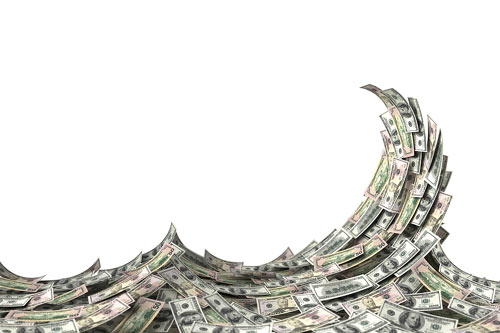
His supporters are testing a highly uncertain proposition: Can a Democrat win statewide in Texas? But in the process, they're also testing another proposition: Does money make a difference in elections?
According to the latest data, O'Rourke has raised nearly $70 million for his Senate run. That's almost double what Cruz has raised. It's more than anyone else in the midterms has raised. And it looks like close to half of the O'Rourke campaign's money has come from outside Texas.
He isn't the only candidate with major out-of-state backing. Stacey Abrams, campaigning to become Georgia's first black female governor, has raised more money outside Georgia than in it, and managed to push the red-state race to a toss-up. In New York, democratic socialist media darling Alexandria Ocasio-Cortez has been heavily bolstered by out-of-state money.
That money is part of a "blue wave" of cash that the Center for Responsive Politics says is washing through the midterms. Democrats are projected to finish with a roughly 15 percent fundraising edge over Republicans in what's shaping up, at a projected $5.2 billion, as a record year for midterm elections spending by campaigns and outside groups on both sides. That gap is boosted by Democrats' decided advantage over Republicans in garnering out- of-state donors.
The unprecedented flow of cash isn't all that surprising. The electorate has been both polarized and energized by the past two years. Voter enthusiasm is at its highest level of any midterm in the past two decades, and three-quarters of voters in both parties say that which party controls Congress will be a factor in their vote.
Unfortunately, Americans increasingly live in districts and states that reliably go for one party or the other. In those highly partisan districts, an individual voter has little chance of changing anything. So why not send a political donation to swing districts where it might actually matter?
Clearly, candidates such as O'Rourke and Abrams have captured the imaginations of progressives longing to strike a blow against President Trump. But those candidates don't need the daydreams of out-of-state progressives as much as the votes of the citizens of the red states where they're running. Unless the money can be translated into votes, it's a nice gesture but not much help.
Contrary to the conventional wisdom, money doesn't necessarily move the needle all that much in elections. Successful candidates do tend to out-fundraise their opponent, but as social scientists are fond of telling us, "correlation is not causation" - snowdrifts don't produce cold weather.
When it comes to money and political success, the causation may run the other way. No one wants to waste money on a no-hope candidate, so the first thing potential donors look for is a plausible path to victory. That's going to steer money toward candidates who were already likely to win. When they do, it will feel to the supporter like the donation "worked."
Of course, money may help in a very tight race. It can also help an unknown candidate get name recognition - table stakes for a credible run, but beyond that basic ante it's not clear that adding more money helps much. Case in point: Hillary Clinton, who raised nearly twice as much as Trump but went down to ignominious defeat.
That problem is particularly acute when the money for a statewide race comes from elsewhere. In-state donor money is at least bundled with a vote, and quite possibly a willingness to volunteer or to harass a friend to pull the lever for the candidate. Out-of-state money comes bundled only with a fond wish that the folks in one state would vote more like people somewhere else. Rather than signaling candidate strength, this sort of wishful money might signal that a candidate appeals to people that the actual voters being courted don't much like.
If money and free media can move elections, then Tuesday night should see Beto O'Rourke graciously accepting Ted Cruz's congratulations, as the blue wave sweeps all Republican majorities before it. But if I were betting my own money, I'd put it on O'Rourke's losing to the charmless debate nerd with the R after his name.
(COMMENT, BELOW)
Megan McArdle is a Washington Post columnist who writes on economics, business and public policy. She is the author of "The Up Side of Down." McArdle previously wrote for Newsweek-the Daily Beast, Bloomberg View,the Atlantic and the Economist.


 Contact The Editor
Contact The Editor
 Articles By This Author
Articles By This Author